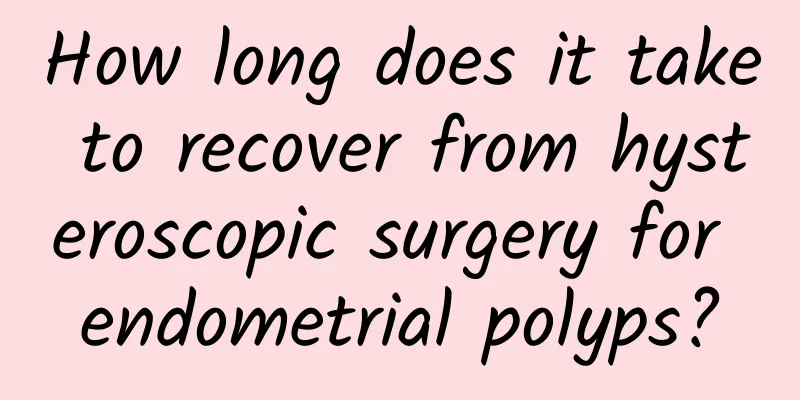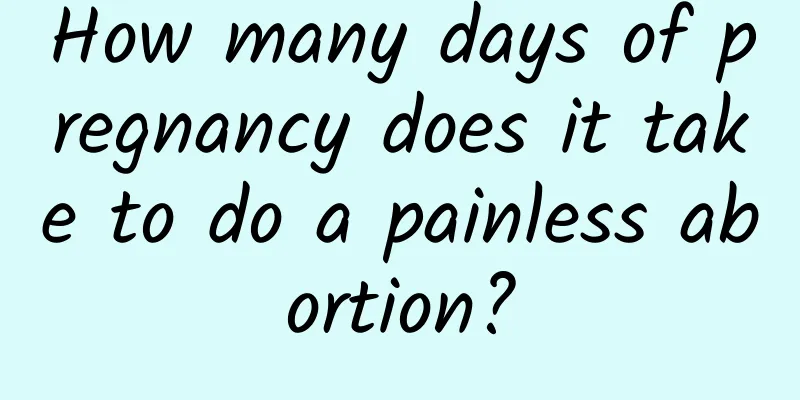How long does it take to recover from hysteroscopic surgery for endometrial polyps?

|
The recovery time after hysteroscopic surgery for endometrial polyps is usually 1-2 weeks, and the specific time varies from person to person. Attention should be paid to postoperative care and regular check-ups. During the postoperative recovery period, avoiding strenuous exercise, keeping the vulva clean, and taking medication as prescribed by the doctor are the keys to promoting recovery. 1. The recovery time after surgery depends mainly on individual differences and the extent of the surgery. Most patients can return to normal life within 1-2 weeks after surgery, but full recovery may take longer. Mild abdominal pain and a small amount of bleeding may occur in the first few days after surgery, and these symptoms usually disappear gradually within 3-5 days. 2. Postoperative care is essential for recovery. Keep the vulva clean and avoid using tampons. It is recommended to use sanitary napkins. Avoid sexual intercourse, bathing and swimming within 1 month after surgery to prevent infection. Pay attention to rest and avoid lifting heavy objects and strenuous exercise to avoid affecting wound healing. 3. Medication is an important part of postoperative recovery. Doctors usually prescribe antibiotics to prevent infection, such as cephalosporins or amoxicillin. For pain management, ibuprofen or acetaminophen can be used. Some patients may need to use hormonal drugs to regulate the menstrual cycle, such as progesterone or birth control pills. 4. Dietary conditioning helps postoperative recovery. It is recommended to consume more protein-rich foods, such as eggs, fish and soy products, to promote wound healing. Increase the intake of fresh vegetables and fruits to supplement vitamins and minerals. Avoid spicy, irritating and cold foods to avoid affecting recovery. 5. Regular follow-up is an important step to ensure a good recovery. The first follow-up should be conducted 1 month after surgery to evaluate the wound healing. Subsequent follow-up examinations should be conducted according to the doctor's advice, usually every 3-6 months. The follow-up examinations include gynecological examinations, ultrasound examinations, etc. to monitor the recurrence of polyps. The recovery time after hysteroscopic surgery for endometrial polyps varies from person to person, but with reasonable postoperative care, medication, diet adjustment and regular check-ups, most patients can return to normal life within 1-2 weeks. Pay attention to physical changes after surgery. If you have symptoms such as abnormal bleeding, fever or severe abdominal pain, you should seek medical attention in time. Maintaining a good living habit and mentality will help promote postoperative recovery and prevent recurrence. |
<<: How to treat moderate cervical erosion
>>: Can I get pregnant with adenomyosis?
Recommend
These are the hazards of candidal vaginitis
Many people do not know what candidal vaginitis i...
What are the precautions for preventing cervicitis?
Cervicitis is a common gynecological inflammation...
What are the symptoms of Bartholinitis?
The Bartholin's glands are located below the ...
Why do women have fat lower bodies? Evolutionary relationship!
(Text/Yang Qilin) Q: Why do women tend to be fat ...
Lifestyle considerations that can help prevent cervical erosion
Cervical erosion is a gynecological disease that ...
Four major hazards of uterine fibroids
What are the main hazards of uterine fibroids? Ut...
What should I do if a 12-year-old girl has irregular menstruation?
Irregular menstruation in 12-year-old girls may b...
How to relieve pain in adenomyosis
How to relieve pain in adenomyosis? Patients with...
How much does it cost to treat intrauterine adhesions?
Intrauterine adhesions are a gynecological diseas...
A brief analysis of the common transmission routes of Trichomonas vaginitis
Many female friends may not have heard of Trichom...
What causes brown discharge during pregnancy?
Brown discharge during pregnancy may be due to ph...
What should I do if I have severe stomach pain during menstruation?
What should I do if I have severe stomach pain du...
What are the symptoms of vulvar leukoplakia that are more common in older women?
Female vulvar leukoplakia is a common gynecologic...
Is vulvar whitening hereditary?
Is vulvar leukoplakia hereditary? Many women deve...
Ectopic pregnancy is usually caused by pelvic tumor compression.
Ectopic pregnancy is usually caused by pelvic tum...









